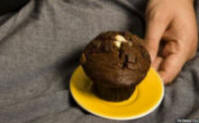Eating Unexplained empty food wrappers and a messy kitchen are what some sleepwalkers face when they wake up. Often snacking in your sleep is not a big problem, but in more extreme cases it is classed as Nocturnal Eating Syndrome (NES). Again, increased awareness of the sleep disorder means more people are being referred to sleep clinics with it.
Sufferers can raid the kitchen several times a night but have no recollection when they wake up. Not only do they lose sleep but they can put on an excessive amount of weight, causing a whole range of problems mentally and physically. Other concerns include choking in their sleep. Like other strange nocturnal behaviour, sleep eating often happens when people experience parasomnias, which half a million Britons regularly do, according to Anderson. When it comes to eating in your sleep often it is related to what happens before bedtime. "Sleepwalkers will often do simple things that make some kind of sense, like eat when having gone to bed hungry or dieting during the day," says Anderson. In more complicated cases, where someone might cook a meal, the person is actually awake but will have no memory of what they have done. It's a type of amnesia, says Prof Jim Horne, from the Sleep Research Centre at Loughborough University. "They are basically in a confused awake state. In these more extreme cases you can't attribute the problem to sleep itself. Often it's a case of stress, for example, affecting sleep." SexSexsomnia, a condition where people have sex in their sleep, has only really been brought to the public's attention in recent years. As yet very little research has been done into it, say sleep experts, but more cases are being reported. It can become more frequent during times of stress or under the influence of alcohol or drugs and ranges from minor behaviour to full sexual intercourse, in some cases with serious consequences. Idzikowski gives expert evidence at trials that involve serious sexual assaults and rape.He says sexsomnia is a parasomnia. It is most likely to occur in the "deep sleep" stage when the thinking and awareness part of the brain is switched off but not the part of the brain responsible for basic urges like having sex."It is instinctive behaviour, people are not conscious at the time," says Idzikowski."When you are in a deep sleep moral and rational decision-making do not occur."It constantly surprises me the type of sleep problems people live with for years. Often they don't realise they can get help."Stop breathingWhen sleepers stop breathing this is often caused by a sleep disorder known as Obstructive Sleep Apnoea (OSA). While it is not a new sleep disorder, an increasing number of people are being referred to sleep clinics with it. As obesity is a contributing factor, experts expect numbers to keep on rising.Continue reading the main storyHow much sleep is needed? People - between 5 and 11 hoursUsually accompanied with very loud snoring, OSA occurs when the throat muscles collapse and block the airways and stop people from breathing - the apnoea. After recently undergoing tests as part of the new BBC One series Goodnight Britain Paul Asbury, from King's Lynn, found out that he regularly stopped breathing in his sleep for up to 26 seconds at a time. "I was really scared when I was told," he says. "It made me panic to think I regularly stopped breathing and for that long. I thought I had a snoring problem but it was much more serious."These breaks in breathing woke the 47-year-old lorry driver up to 50 times an hour during the night. In extreme cases it can be up 80 times, says Idzikowski."The sufferer will often not remember waking up. This is because the brain does not quite connect with the body, so the person is awake but doesn't know it. It can take up to a minute for the brain to connect with the body causing people to be conscious of waking up."The result is that sufferers get very little deep sleep which is one of the restorative phases of the sleep cycle. In the morning they usually feel incredibly tired," says Idzikowski.This can have serious consequences if people are doing things like operating machinery. Asbury's disorder is being treated using a special face mask, which is working so far.. |
| God is our Guide | cidpusa No -1 | |||||||||||||||||||
CIDPUSA.ORG |
||||||||||||||||||||
|
| |||||||||||||||||||